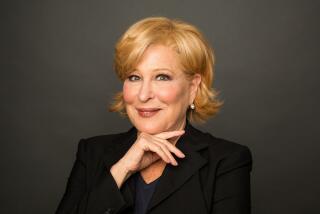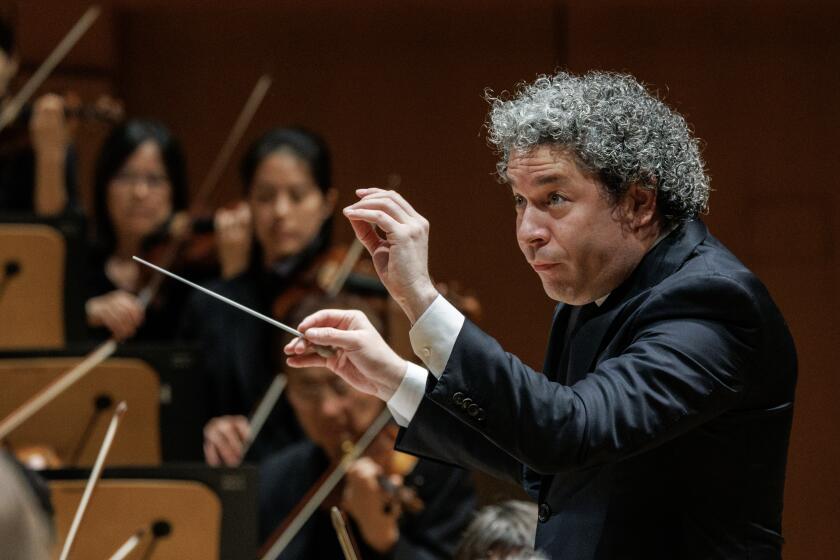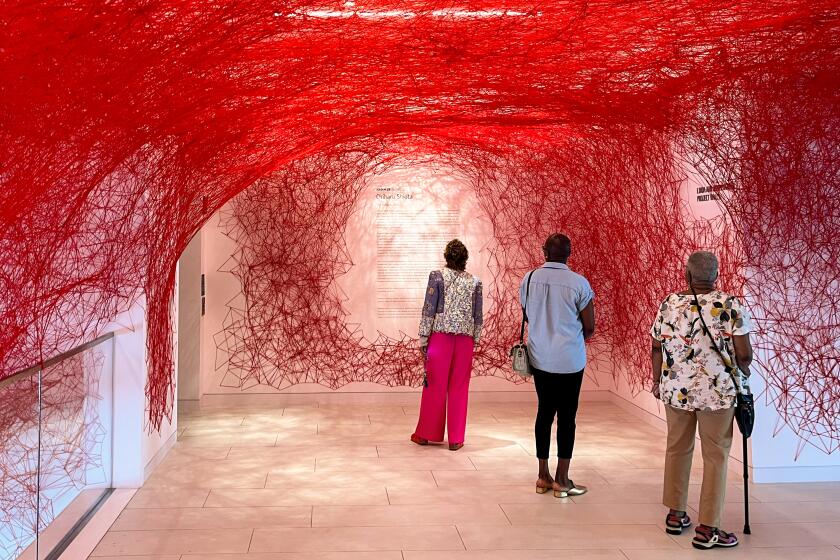Behr: Just Another Aspiring Maestro : Music: At 39, Music Center Opera’s resident conductor is pianist and musical confidant to diva Maria Ewing. Yet to come: symphony orchestras.
Glorious entrances and exits are hardly par for the opera conductor--he treads through orchestra pit to the podium with only a moving spotlight to mark his appearance.
But tonight when Randall Behr presides over the Music Center Opera’s opening of “Il Barbiere di Siviglia,” he will be fulfilling an old European tradition observed by none less than Toscanini, Karajan and Solti.
“That’s the way it always was for aspiring maestros,” says Behr, 39, whose title as resident conductor not only puts him in a high profile with Los Angeles’ young company, but also carries certain burdens.
Toscanini, he explains, didn’t lead the New York Philharmonic until he was 60 and Karajan kept regular hours in La Scala’s pit until he was in his mid-50s.
Only now, in the jet age, do many contenders bypass the hard work and long hours of opera. But this native of Modesto was magnetized to the lyric muse as a teen-ager and also aims to stretch himself to the symphony orchestra realm.
“The big blinders-off moment came when I was 15,” says the impish musician, laughing at the memory. “(Attending) Hidden Valley Academy (near Carmel), and discovering opera people who really lived music, did it for me.”
After that came study in Rome and a return to Carmel for performances of “Don Giovanni,” no less.
“That I said yes and didn’t even blink at the gargantuan challenge tells you about my naivete.” Tapped then, at 22, by the mentoring Kurt Herbert Adler for the San Francisco Opera, Behr found his major apprenticeship.
He also found a young singer there named Maria Ewing--he conducted and she sang in SFO’s “Perichole” in 1976. At the time she was a protegee of James Levine, that other opera conductor-pianist (now the Met’s artistic head). But in 1989 when she agreed to sing “Salome” here for the second time, Behr was signed to conduct the revival and they had a momentously accidental reunion.
Lured away from his music directorship with the Long Beach Opera, he launched a collaboration with Ewing that also saw her Music Center debuts as Tosca and Butterfly.
Indeed, he seems to have replaced Levine as the diva’s musical confidant-pianist, accompanying her recitals in prestigious locales--London, Florence, Paris and Vienna.
Half-gulping a sandwich during a rehearsal break, he admits to having been nonplussed by his big-time exposure when he spied Alfred Brendel in one recital audience (Covent Garden) and Carlos Kleiber in another (the Chatelet in Paris).
Yet now, Behr regularly presides over casts that include such luminaries as Placido Domingo and Frederica von Stade, who sings Rosina in this production of Rossini’s opera. And he thanks Peter Hemmings “for changing the course of my career, for giving me these dazzling assignments and the chance to work with a major company that has a major budget.”
Of the singers, he says: “They’re like family, they even trust me, the fools.” He laughs, outlining 12-hour rehearsal schedules.
“Unions were made to protect people from the likes of me.”
Turning more serious, Behr says that gaining his colleagues’ trust is definitely a major factor in successful opera conducting.
“Every artist has ways that work for him or her. How you assist Placido is different from how you assist Neil Shicoff. You must learn who can change and who can’t, who remembers and who doesn’t and sometimes you cut bait.”
A bigger issue, however, and one that often determines a career’s potential, rests with the political goings on.
Behr’s title as resident conductor carries a connotation of something less than elevated. As it stands, he must be able to jump in on a moment’s notice for someone who cancels or arrives late. And while he now gets a good share of the prestigious new productions, as opposed to revivals or borrowed ones, he says he must assume responsibility “for everything.”
“The trick,” he says, “is to do the job without falling into the identity of flunky. But I must admit there’s that aspect. Still, there are the opportunities--getting first dibs when (another conductor’s) contract is broken. Not that it’s forced upon me. And I’m definitely not an assistant.”
As to who’s boss, Behr says there is no question: “It’s Peter Hemmings’ company. He consults me, as he consulted Charles Dutoit (the noted conductor of “Les Troyens”). But Peter makes the decisions and chooses the casts.”
While the resident conductor is thoroughly appreciateded by the company, Hemmings says: “I still pinch myself to make sure Randy Behr lives here and works for us.”
Says Von Stade: “He’s an absolutely wonderful musician to work with.”
Behr admits to “never having figured out how to navigate around the political shoals. On the other hand it would be disingenuous of me to say that politics do not define in large part what a conductor is. These are very difficult questions for me.”
Especially so because Placido Domingo, in return for helping to establish the company, seems to have carved out a future role perhaps as music director.
Of these issues with Behr and Domingo, Hemmings says: “We have an open-ended policy with both of them and Placido confirms regularly how fortunate we are to have Randy.”
Sometimes, when Behr is not studying scores, conducting opera here or in Barcelona and Hamburg, or accompanying Maria Ewing in music capitals everywhere, he thinks about other matters:
“Where, for instance, is the new repertory going to come from, the works that speak to our own concerns? Why are we left to graft those issues onto 19th-Century operas?”
“When,” asks Behr, “will we not be asking the name of someone’s favorite piece set on the moon?”
More to Read
The biggest entertainment stories
Get our big stories about Hollywood, film, television, music, arts, culture and more right in your inbox as soon as they publish.
You may occasionally receive promotional content from the Los Angeles Times.






